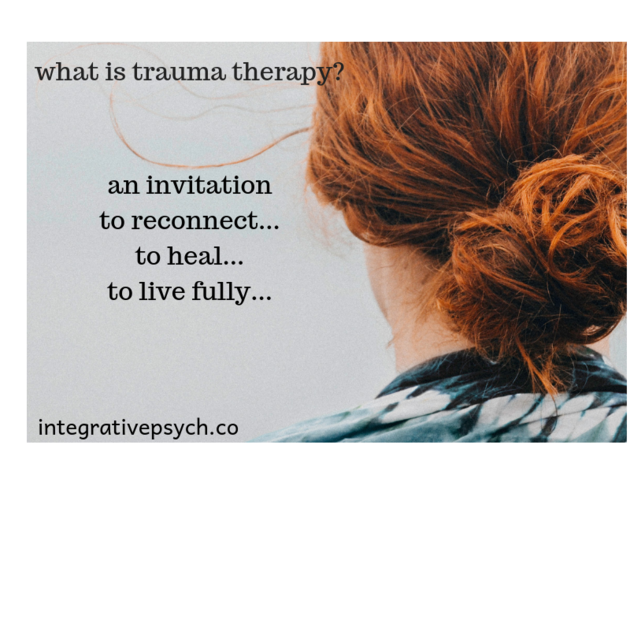
Trauma and Trauma Therapy
Have you ever experienced a disturbing event that left you with this sense of overwhelm, helplessness and feeling out of control? If yes, it's possible that the stressful situation traumatized you. Psychological trauma leaves its mark by leaving you grappling with memories, anxieties and upsetting emotions that just won't let up.
Traumatization can also present itself if you are left feeling disconnected, unable to trust others or feeling numb. As human beings, none of us can avoid the difficulties and sometimes traumatic experiences of life. However, we are all impacted differently. If you've been impacted by traumatic stress, I encourage you to prioritize your healing so you can get back to a healthy equilibrium. Trauma and stress can be tough, but they don't need to leave a lasting impact.
What is emotional and psychological trauma?
Emotional and psychological trauma come from experiences that, most often, involve a threat to your life or safety. It's the level of extraordinary stress that robs your sense of safety and makes you feel like you're powerless in a dangerous world. Now, traumatic experiences don't need to involve physical harm, per se. The determining factor of trauma is the individuals' subjective experience. Regardless of the external situation, the more you felt frightened and helpless, the more traumatized you will be. Common causes for trauma are:
-
Single incident events-also referred to as shock trauma. ex: an attack (physical, sexual), an injury, accident or shocking event. This is especially traumatic if it was shocking to you (came unexpected) and even more so, if it happened when you were young.
-
Repetitive, ongoing and consistent stress -also referred to as complex trauma. ex: ongoing bullying, chronic childhood neglect, domestic abuse, living in a danger zone such as a war zone, or crime-filled neighborhood, battling a life-threatening illness or facing an ongoing traumatic event.
-
The Less Identified Traumas- what I call the "Silent Wounds". These are the commonly overlooked situations that often cause trauma. ex: experiencing a deeply embarrassing or disappointing experience, losing someone close to you (due to death or moving cities), breaking up with a significant relationship in your life,or interacting with someone who is deliberately cold hearted or cruel (at work or in personal life.) This may also include feeling chronically ignored, unseen, or experiencing chronic stress for example: mom constantly yelling or seeing high conflict (or complete disconnect) in your parents while growing up.
-
Traumatic Stress Traumatic stress refers to the experience of stress related to events you weren't directly involved in but cause you a lot of distress. For example, when you hear about man-made disasters such as terrorist attacks, mass shootings, plane crash, or natural disasters, such as a flood, tornado or fire. Although you may not have been directly impacted, watching the news and seeing horrific images can leave an imprint on your mind and body.
One important thing to note is that since we are all uniquely different, we all react differently to emotionally distressing or traumatic experiences. There is absolutely no right or wrong way to feel, think, respond or react. If you've picked up a belief or behavior that is negatively impacting you, please don't judge yourself; I encourage you to understand it as your mind's attempt to coping with an abnormal situation.
How childhood trauma impacts your susceptibility to current trauma.
Trauma isn't a magnet. It doesn't know who to "pick" and traumatize, however, if you've been traumatized before, are under a lot of stress or experienced a recent loss, your system will be more susceptible to being traumatized by a shocking event. This is especially true if you've experienced childhood trauma, as those are the developing years where you brain builds neural networks, learns to acclimate to environments as well as practicing self soothing. Common childhood traumas include:
-
Being separated from a parent
-
Being raised in an chaotic, unsafe or unstable environment (ex. alcoholic or mentally unstable parent)
-
Experiencing physical, verbal or sexual abuse
-
Experiencing neglect- emotional inattentiveness
-
Being exposed to or experiencing domestic violence
-
Experiencing serious illness
-
Going under intrusive medical procedures
Treating Trauma: A road to embodied living
The good news is that there are ways for you to let go of the pain, learn to trust yourself, reconnect with others and develop a safer way of being. I've worked with courageous individuals who, in their adult years, healed younger wounds. As one individual expressed:
" I can't believe this is how life is supposed to feel. I'm getting to know what it's like to be emotionally balanced and to feel like the world is a place I'm able to be in. I used to think the world was out to get me. But now I see I was shadowed by fear and easily affected by every small interaction. Now I can move through events and experiences with much more ease and strength."
Those who took the time to work through traumatic events, memories and self beliefs slowly reprogrammed their thinking and feeling and learned ways to better navigate the world. Doing this allows the individual to be able to fully dive into daily experiences. Regardless of if the trauma happened yesterday, last year or a decade ago, your choices today can move you forward in ways that you need.
Where to begin healing
There are different trauma therapies to help you relieve the feelings, beliefs, memories or pent up "fight-or-flight" energy that are stuck in your body. Common trauma therapy methods:
-
Somatic Psychotherapy (somatic experience or sensorimotor psychotherapy) Somatic therapies focus on healing from the bottom up; leaning into the body sensations and experience of the event rather than simply discussing the thoughts and memories via talk therapy. Somatic methods help you release pent up trauma related energy by concentrating on what is happening in, on, and around your body. This can be expressed via crying, shaking, trembling or any other way your body may need to express movement and tension.
-
Cognitive Behavioral Therapy, a therapy that helps you separate, understand and process your thoughts and feelings about trauma and the beliefs associated with it here-and-now and back then.
-
EMDR (Eye Movement Desensitization and Reprocessing) this therapy blends beliefs, cognitive thoughts and eye movements, also known as bilateral stimulation) activating the left-right brain stimulation to help "digest" memories and beliefs that are frozen in trauma time.
-
Parts Work Parts therapy refers to identifying parts of self that exist within one human being. We all have an adult self that helps us function in daily life, a worker self, a social self and nurturing self. We also may have parts of self that came into being due to a trauma or stress that may be impacting daily life. For example if you have a highly critical part of self that came to protect you against intense criticism, a cynical part or an angry part- they may have helped you survive hard times, but may be impacting your current identity or impact how you show up in relationships. Parts work helps work through inner conflicts so that you can live with more ease internally.
Step into today. Let go of the narrative of the past.
If you've been struggling with a trauma, make the choice today to begin healing and living a better life. Feel free to reach out via integrativepsych.co so we can help you find the best help for your therapy.
*originally published at integrativepsych.co
Esther Goldstein LCSW is psychotherapist and trauma specialist with a private practice in Cedarhurst, NY. Esther specializes in treating professionals with anxiety, overwhelmed moms and individuals who want to have more meaningful relationships. Specialty areas include: EMDR therapy, somatic therapy, trauma treatment, complex ptsd and dissociative disorder treatment. As well, Esther provides trauma informed consultation to therapists committed to improving their trauma-informed practice and attachment focused EMDR consultation to therapist attaining hours towards EMDRIA certification. Esther's website is Integrativepsych.co

 Previous
Previous

